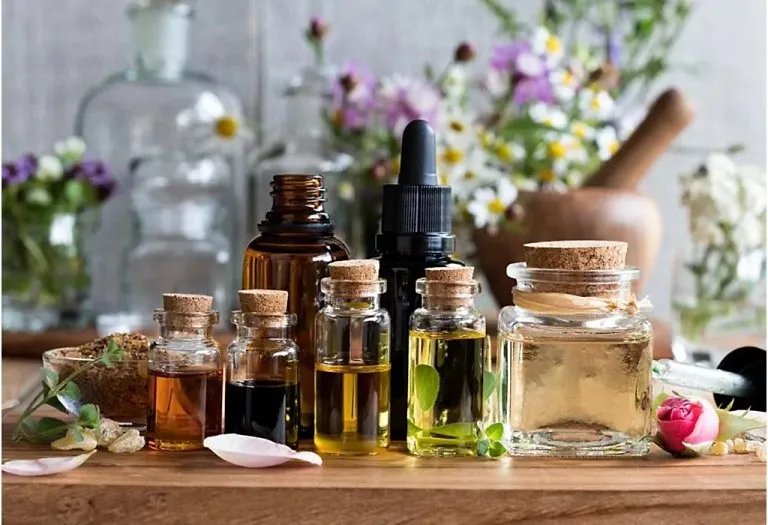Essential Oils for Breastfeeding Moms – Benefits and Cautionary Tips

Caring for your little one is a joy, and breastfeeding can enhance this bonding experience. From diaper changes to adjusting to your baby’s sleeping pattern, it can be exhausting, making it crucial to stay patient with both yourself and your baby during this time.
Essential oils can be a great help in soothing your stressed nerves, both physically and mentally. After putting your little one to sleep, soaking in a hot bath with aromatic essential oils can be incredibly relaxing. However, it’s important to educate yourself about which essential oils are most beneficial for you and your baby while breastfeeding. Understanding their benefits and proper use ensures a safe and pleasant experience for both of you. Read on to learn more about breastfeeding and essential oils.
What Are Essential Oils?
Essential oils are compounds extracted from plants. These compounds hold the scent and flavour of the plant and are what is considered to be its essence. Each of the plants that the oils are extracted from gives the oils their unique aroma and health benefits. They are extracted through the process of distillation, or other mechanical techniques such as cold pressing. Once the chemical compounds containing the aroma are obtained, they are mixed with carrier oils and are then ready to be used as essential oils.
Are Essential Oils Safe for Breastfeeding Mothers?
Are essential oils safe for nursing mothers? According to the Cleveland Clinic, good quality essential oils provide a natural way for mothers to soothe their aching muscles, reduce stress and indulge in aromatherapy (1). They do not have any ill effects on the little ones as long as you use the oils that are considered safe for children.
How to Make Sure Essential Oils Are Safe for Your Newborn?
Avoid ingesting the oils as they are not safe for your baby (2). Only use the oils topically and after diluting them in carrier oils such as sweet almond, hemp seed or coconut oil. Having said that, each essential oil and carrier oil combination will have a different effect on different mothers. It is, therefore, advisable to have a medical consultation before using any essential oil. Also, avoid all oils that were extracted using solvents such as butane or hexane as these chemicals could leave traces of the solvent in the oils. It is best to avoid using essential oils as much as possible, except for when it is really needed.
How to Use Essential Oils to Boost Milk Supply?
Here are some ways you can use essential oils to boost your milk supply (3):
1. Apply on the Breast
Applying essential oils along with a carrier oil, can help you boost your breast milk supply. Take about one teaspoon of coconut oil, add one drop of basil oil and mix well. Then, apply the oil on your breasts except for the nipples, and gently massage in small circular motions with your fingertips.
2. Apply on Pulse Points
This is one of the best ways of using essential oils for breastfeeding. Our bodies have several pulse/ acupuncture points that can be stimulated with the help of essential oils. Apply the same formula mentioned above on your ankles as they are the pulse points that correspond to your breasts. You can also use lavender essential oil on the outside of your ears to help you relax, and produce more milk.
3. Diffuse the Oils
Use about four drops of either lavender, basil or fennel essential oils in your diffuser before you go to bed. Do not overdo it; one hour per day is enough to reap the benefits of this method and the oils. If you do not have a diffuser, you may take a ceramic bowl full of hot water and add a tiny drop of essential oil to it. Keep it by your bedside or in the living room, but away from your baby. You may use this technique to make the most of your power nap.
Essential Oils and their Benefits during Breastfeeding
Here is a list of a few essential oils and their benefits for breastfeeding mothers:
1. Lavender
Lavender is a well-known essential oil known for its ability to calm and relax the user. It is often used to help induce sound sleep and do away with restlessness (4). Lavender is, therefore, one of the most recommended essential oils for aromatherapy.
2. Frankincense
This oil is also known for its ability to reduce stress and anxiety and is often used to treat stress-related disorders.
3. Chamomile
This wonderful essential oil is used as an antidepressant and to help with anxiety. The oil also helps reduce insomnia, relieve pain, and is also beneficial in general healing and detoxing (5).
4. Tea Tree Oil
This anti-fungal, anti-bacterial and antiseptic oil is used to treat mastitis (6).
5. Cypress
This essential oil can help fight infections and relieve stress and muscle pain. It can also heal wounds and infections when used appropriately.
6. Peppermint
While most mothers want oils to help increase their milk production, there are others who actually suffer from overproduction of milk. Peppermint essential oil during breastfeeding can help reduce milk supply in nursing mothers who have a tendency to overproduce breast milk (7). Peppermint is to be used with caution, as it has the capacity to stop breast milk production altogether.
Which Essential Oils Should Be Avoided While Breastfeeding
There are several essential oils that should be avoided by women due to their potency and properties that can be dangerous to your child. Eucalyptus, myrrh, camphor, basil, rosemary, aniseed, sage, mugwort, oregano, parsley, and nutmeg are a few oils to stay clear from (8).
Precautions While Using Essential Oils for Breastfeeding
Here are some tips you may find useful when using essential oils during pregnancy (9):
- Do not ingest the oils.
- Be careful to wipe off any oil from your breasts before you begin to breastfeed your baby.
- Use only 1% of the essential oil in a carrier oil.
- Always use pure and 100% organic essential and carrier oils.
- Give preference to the other methods of boosting milk supply over essential oils if possible.
- Conduct a patch test on a small area of your skin to check for any allergic reactions before using the oil extensively.
- Avoid applying essential oils directly to your nipples or areas where your baby might come into direct contact.
- Avoid using essential oils with strong scents that may irritate your baby or interfere with their natural scent recognition.
- Consult with a healthcare professional before using any essential oils to ensure they are safe for you and your baby.
FAQs
1. Are there essential oils that can help with breastfeeding pain or engorgement?
Yes, essential oils like lavender and geranium can help relieve breastfeeding pain or engorgement. Dilute them properly in a carrier oil and apply them around, but not directly on, the breast area to avoid any contact with the baby’s mouth.
2. Can essential oils help with cracked nipples or soreness?
Some essential oils like helichrysum and calendula have soothing properties that may help with cracked nipples or soreness. However, it’s essential to dilute them properly in a carrier oil and avoid applying them directly to the nipples, ensuring they don’t come into contact with the baby’s mouth.
3. Can essential oils interfere with breastfeeding hormones or affect my baby’s development?
While there’s limited research on this topic, some experts suggest that certain essential oils, particularly those with hormonal properties like clary sage or peppermint, should be used with caution during breastfeeding to avoid any potential impact on hormone levels. Consultation with a healthcare provider is recommended for personalized guidance.
4. How should I store essential oils safely around my baby?
Store essential oils in a cool, dark place, preferably in a locked cabinet or out of reach of children, including babies. Ensure that the bottles are tightly closed to prevent accidental spills or ingestion. Additionally, consider using childproof caps or safety locks on cabinets for added security.
This was all about essential oils and nursing. Always remember that while essential oils are good for you and provide a lot of benefits, your baby is still very delicate and essential oils can sometimes cause problems for him or her. Use the right amount of essential oils and always ensure that you speak with your doctor about what oils you want to use and get his or her approval before you go ahead with it.
References/Resources:
1. The Safe Use of Essential Oils; International Childbirth Education Association; https://icea.org/the-safe-use-of-essential-oils/
2. Are Essential Oils Safe for Children?; Johns Hopkins Medicine; https://www.hopkinsmedicine.org/health/wellness-and-prevention/are-essential-oils-safe-for-children
3. Mikaningtyas. E, Santoso. B, Runjati, Mardiyono, Pujiastuti. R; Lacta Massage Using Fennel Essential Oil to Increase Prolactin Hormone Levels in Postpartum Mothers; International Journal of Science and Research; https://www.ijsr.net/archive/v7i9/ART20191126.pdf
4. Vaziri. F, Shiravani. M, Najib. F, Pourahmad. S, et. al.; Effect of Lavender Oil Aroma in the Early Hours of Postpartum Period on Maternal Pains, Fatigue, and Mood: A Randomized Clinical Trial (International Journal of Preventive Medicine); National Library of Medicine; https://www.ncbi.nlm.nih.gov/pmc/articles/PMC5439291/; May 2017
5. Chamomile; Drugs and Lactation Database; National Library of Medicine; https://www.ncbi.nlm.nih.gov/books/NBK501808/
6. Tea Tree Oil; Drugs and Lactation Database; National Library of Medicine; https://www.ncbi.nlm.nih.gov/books/NBK501884/
7. Akbari. S, Alamolhoda. S, Baghban. A, Mirabi. P; Effects of menthol essence and breast milk on the improvement of nipple fissures in breastfeeding women (Journal of Research in Medical Sciences); National Library of Medicine; https://www.ncbi.nlm.nih.gov/pmc/articles/PMC4214021/; July 2014
8. The Safe Use of Essential Oils; International Childbirth Education Association; https://icea.org/the-safe-use-of-essential-oils/
9. Factors that influence the safety of essential oils; The National Association for Holistic Aromatherapy; https://naha.org/explore-aromatherapy/safety
Detox when Breastfeeding
Breast Massage for Breastfeeding
Is Using Deodorant Safe while Breastfeeding?
Is It Safe to Consume Flaxseed while Breastfeeding?
Lactation Supplements Every Mother Should Take
Was This Article Helpful?
Parenting is a huge responsibility, for you as a caregiver, but also for us as a parenting content platform. We understand that and take our responsibility of creating credible content seriously. FirstCry Parenting articles are written and published only after extensive research using factually sound references to deliver quality content that is accurate, validated by experts, and completely reliable. To understand how we go about creating content that is credible, read our editorial policy here.



































